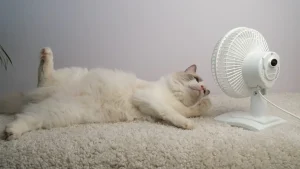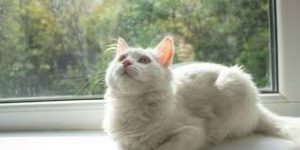If you’ve ever noticed your cat lounging more than usual, napping longer, or moving at a slower pace during the summer months, you’re not alone. Many cat owners get worried when their usually energetic feline suddenly seems less playful or less interested in food once the weather heats up.
So, why does my cat slow down in the summer? Is this normal? Should you be concerned? Or is your cat simply adjusting to the summer heat the way humans slow down during a hot day?
In this article, we’ll take a deep dive into why cats slow down in the summer, what’s perfectly normal versus what’s a red flag, and how you can make your furry friend more comfortable during hot weather. By the end, you’ll understand your cat’s seasonal behavior from every angle — and feel confident knowing when to relax and when to take action.

Why Do Cats Seem Less Active in Summer?
At the simplest level, cats slow down in the summer for the same reason people do: heat drains energy. Warm weather naturally causes both humans and animals to conserve energy, avoid unnecessary exertion, and look for cool, shady places to rest. But cats also have some unique biological and behavioral reasons for their summer slowdown.
1. Heat Regulation and Energy Conservation
Cats are warm-blooded mammals, and their bodies have to work harder to stay cool in high temperatures. Unlike humans, cats don’t sweat across their skin. Instead, they rely on:
-
Panting (rarely, and usually only when very hot)
-
Sweating through their paw pads
-
Grooming to spread saliva on their fur, which evaporates like sweat
-
Seeking shade and lying flat on cool surfaces
All of these are energy-saving strategies. Instead of running around and generating more heat, your cat instinctively slows down to regulate body temperature.
2. Seasonal Changes in Metabolism
Research suggests that cats — like many animals — have seasonal fluctuations in metabolism. In cooler months, their bodies burn more calories to stay warm, leading to increased activity and sometimes a bigger appetite. In summer, the opposite happens: metabolism slows, appetite may decrease, and energy levels drop.
3. Instincts from Wild Ancestors
Domestic cats may live in air-conditioned homes, but their instincts are rooted in wild feline behavior. In hot climates, wild cats hunt during cooler dawn and dusk hours and rest through the hottest parts of the day. Your house cat follows a similar rhythm — you may notice bursts of energy in the early morning and evening, with long naps in between.
How Much “Slowing Down” Is Normal in Cats During Summer?
This is the big question: how do you know if your cat is just adapting to the heat or if something is wrong?
Normal summer slowdown includes:
-
Sleeping longer than usual (cats already sleep 12–16 hours daily, but in summer it can increase to 18+)
-
Reduced appetite (slightly)
-
Choosing cooler surfaces to lie on (tiles, bathroom floors, shaded corners)
-
Less interest in play during the daytime
Possible warning signs include:
-
Extreme lethargy (not moving much even at night or morning)
-
Refusal to eat or drink altogether
-
Rapid breathing or continuous panting
-
Drooling, vomiting, or diarrhea
-
Hiding in unusual places for long periods
If you notice the latter, your cat may not just be tired from the heat — it could be heatstroke, dehydration, or an unrelated illness.
The Hidden Risks of Summer for Cats
Understanding why cats slow down in summer also means being aware of the dangers hot weather can bring.
1. Dehydration
Cats are notorious for not drinking enough water. In hot weather, this can quickly become dangerous. Signs of dehydration include dry gums, sunken eyes, and skin that doesn’t spring back when gently pulled.
2. Heatstroke
Cats can develop heatstroke if they’re exposed to very high temperatures without relief. Symptoms include rapid breathing, bright red gums, drooling, vomiting, staggering, or collapse. Heatstroke is a veterinary emergency.
3. Sunburn
Especially in light-colored or hairless breeds, sunburn is a real risk. Cats may slow down simply to avoid the discomfort of too much sun exposure.
4. Fleas, Ticks, and Parasites
Warm weather also means parasite season. If your cat is slowing down and scratching excessively, flea infestations may be part of the problem.
How to Help Your Cat Stay Comfortable in Summer
If your cat is moving more slowly in summer, you can take steps to make them feel better and keep them safe.
1. Keep Fresh Water Everywhere
Cats drink more when water is easily accessible. Try:
-
Multiple water bowls in different rooms
-
A pet fountain (cats love running water)
-
Adding ice cubes to bowls to keep it cooler
2. Provide Cool Resting Spots
-
Let your cat access tiled floors, bathtubs, or shaded areas
-
Use cooling mats made for pets
-
Keep curtains closed in sunniest rooms during the day
3. Adjust Playtime
Instead of forcing your cat to play during the hot afternoon, schedule play sessions early in the morning or later in the evening when the temperature drops.
4. Grooming Helps
Brushing your cat regularly removes excess fur and helps their body stay cool. Long-haired cats, in particular, benefit from frequent grooming in summer.
5. Watch the Outdoor Cats
If your cat goes outdoors, make sure they always have access to shade and fresh water. Avoid letting them out during peak heat hours (noon–4 pm).
Myths and Misconceptions About Cats and Summer
Myth 1: “Cats don’t get hot like dogs.”
False. Cats may not pant as visibly, but they can absolutely suffer from heatstroke.
Myth 2: “If my cat isn’t eating, it’s always heat-related.”
Not always. Some drop in appetite is normal, but a complete refusal to eat may signal illness.
Myth 3: “Cats should be shaved in the summer to stay cool.”
Not necessarily. A cat’s coat actually provides insulation, protecting them from both heat and sunburn. Trimming long fur may help, but full shaving can sometimes make them less comfortable.
Real-Life Example: Summer Behavior Shifts
One cat owner described how their normally playful tabby became a “carpet ornament” every July — stretched out on the tiles, refusing toys, and eating less kibble. After a quick vet visit to rule out illness, it was clear that the cat was just adapting to summer. The solution? A combination of cooling mats, fresh water, and evening play sessions. The cat perked up without stress, and the owner learned not to panic every summer.
Mistakes Cat Owners Often Make in Summer
-
Assuming slowing down always means illness (sometimes it’s perfectly normal)
-
Leaving windows open without screens (cats may jump or fall)
-
Not adjusting diet (wet food can increase hydration)
-
Forcing activity (cats self-regulate for a reason)
-
Skipping parasite prevention (fleas and ticks thrive in heat)
Industry Insights: What Vets Say About Summer Cats
Veterinarians often reassure owners that cats naturally slow down in summer, but they also stress prevention. According to animal health experts, the majority of summer-related cat emergencies come from preventable issues: dehydration, heatstroke, and flea infestations. The best approach is awareness plus proactive care.
FAQs About Cats Slowing Down in Summer
Q: How can I tell if my cat is too hot?
A: Look for signs like excessive grooming, lying stretched out, warm paw pads, rapid breathing, or hiding in cool spots.
Q: Do cats sleep more in summer?
Yes. Cats already sleep a lot, but the heat encourages even longer naps.
Q: My cat barely eats in the summer — should I worry?
A small drop in appetite is normal, but refusal to eat for more than 24 hours needs a vet check.
Q: Can indoor cats get heatstroke?
Absolutely, especially if the house is hot with poor ventilation. Always provide cool spots and fresh water.
Q: Should I give my cat ice water?
Yes, adding ice cubes can encourage drinking. Just make sure the water isn’t so cold it discourages them from drinking.
Q: Are certain breeds more sensitive to heat?
Yes. Persian cats and other flat-faced (brachycephalic) breeds are more prone to heat-related issues.
Q: Can I use fans or AC for my cat?
Yes, both help. Fans may not lower body temperature much but provide comfort. Air conditioning is safe and effective.

Final Thoughts: A Summer of Rest, Not Worry
When summer arrives and your cat slows down, it’s usually just their natural way of coping with heat. As long as you see normal summer adjustments — longer naps, less daytime play, cooler resting spots — there’s little to worry about. But knowing the warning signs of trouble is equally important, because cats are masters at hiding discomfort until it’s serious.
Think of your cat’s summer slowdown as a seasonal shift rather than a problem. By keeping water fresh, offering cool spaces, and adjusting your expectations for play and activity, you’ll help your cat glide through the hot months safely and happily.
So next time your cat seems like they’ve traded zoomies for snoozies, remember: it’s not laziness — it’s survival wisdom passed down from their wild ancestors.
